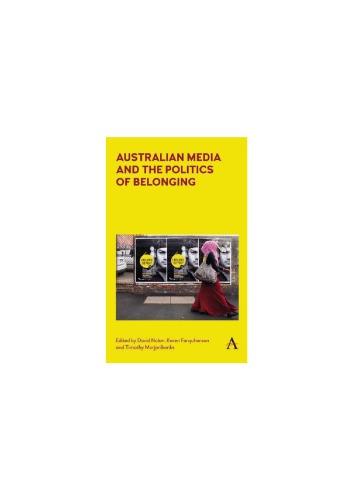Product desciption
Australian Media And The Politics Of Belonging David Nolan Karen Farquharson And Timothy Marjoribanks Eds by David Nolan, Karen Farquharson And Timothy Marjoribanks (eds.) 9781783087808, 1783087803 instant download after payment.
An important resource for understanding, and makes a vital contribution to, debates surrounding belonging in Australia.
Australian Media and the Politics of Belonging explores mediated debates about belonging in contemporary Australia by combining research that proposes conceptual and historical frameworks for understanding its meaning in the Australian context. A range of themes and case studies make the book a significant theoretical resource as well as a much-needed update on work in this area. Australian Media and the Politics of Belonging also provides an intervention that engages with key contemporary issues, questions and problems around the politics of belonging that are relevant not only to academic debate, but also to contemporary policy development and media and popular discussion.
The chapters address a variety of key issues and questions regarding the ethics of media practice and actual media practices – consideration of ethical obligations, media treatment of different populations and the degree to which media serve not only as sites through which a range of voices contribute to definitions of Australian belonging but also, significantly, as a means through which such voices can be heard. An engagement with the problem of ethical practice also asks how a greater understanding of the impact of media representations can contribute to new ethical frameworks and new forms of media practice in areas of key sensitivity such as the reporting of Islam. In addressing such issues ‘Australian Media and the Politics of Belonging’ provides an important resource for understanding, and makes a vital contribution to, debates surrounding belonging in Australia.
‘This exciting collaboration between some of Australia’s key sociologists, journalists and scholars of media is a must-read for those interested in how ethnic minorities, particularly those of African and Muslim backgrounds, are (re)constructed as “other” in more and less explicit ways in the Australian media.’ —Farida Fozdar, Associate Professor, Anthropology and Sociology, University of Western Australia
‘This book illustrates the constitutive role of media in the construction, as well as dissemination, of political projects of belonging. Focusing on Sudanese immigrants in Australia, it demonstrates the political discourses of who is included and who is excluded in the contested and shifting boundaries of the Australian national collectivity, highlighting the processual multi-layered nature of national belonging.’ —Nira Yuval-Davis, Director, The Centre for Research on Migration, Refugees and Belonging, University of East London, UK
‘This remarkable book is at once a sophisticated theoretical exploration of the theme of media and “belonging” – that is, the feeling of being “at home” in a given community and recognized as such by others – and an unprecedented study of media interventions designed to extend and enhance belonging by bridging the gap between media theory and media practice. A critical analysis of journalists’ efforts to mentor Sudanese-Australians so they might gain a voice and contest hostile media narratives exemplifies the book’s unstinting commitment to probe the complexities, and limitations, of efforts to achieve social inclusion via the media. The book is thoughtful, original and inspiring. It sets a new standard for critical research on the Australian media. It will find audiences in journalism studies, political communication, sociology, mass communication, and ethnic and migration studies. —Penny O’Donnell, Senior Lecturer in International Media and Journalism, Department of Media and Communications, University of Sydney, Australia


